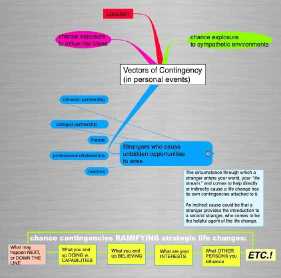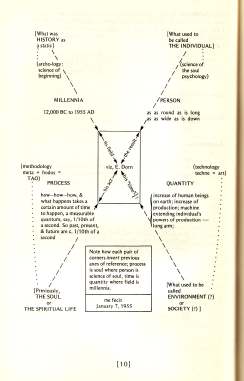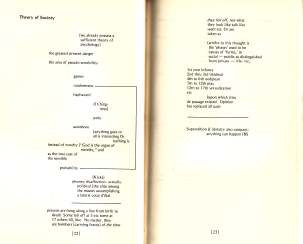I’m going to try here to rope in a few colleagues to respond in public–here–to something I’ve been playing around with off and on for four years. To set this up, here is an edited version of an email I sent to a friend in February.
I have a very important intellectual inquiry to address to you.
Here’s the context. In 2005 I trained ‘street anthropologists’ to conduct informal inquiries about why members of their community had landed in that community. It was framed for me as a Boas-like drill down and the results were given by respondents as simple phenomenological answers. Since the goal was more to learn from the process of inquiry than to generate research for other uses, the debrief was as much about what it was like to experience the act of asking and listening.
However, something became obvious when we debriefed the survey. It was this: almost everybody surveyed ended up living in the community due to a priori features of their personal circumstance prior to their relocating to this community. These features turn out to be extremely fragile. Which is to say: that the features are each contingent on other fragile features.
So: the features are both necessary and also contingent upon other necessary features. What necessarily promoted the decision to relocate fanned out into very fragile webs of necessary “prior” conditions. Had one of those conditions been slightly different, the decision would have been different and the respondant would have ended up locating somewhere else.
I’ll give an example I have used to illustrate this. In 1974 I was working in a record store in my hometown of Cleveland and on a June afternoon a robber stuck the store up, marched me into the backroom, had me lay down, and shot me in the back. I was not badly wounded, but the bullet struck me two inches from my spine. A month later I decided to move (the hell) away from my hometown and took a bus to Vermont. Being shot allowed me to re-rationalize my–at the time–confused sense of where I was going in my life.
In Vermont, over time, I met my wife-to-be, developed my ‘karass’ and met lifelong friends, read through shelves of books while working at desk in the back of a book store, had remarkable encounters, met important influences, had wild once-in-a-lifetime experiences like staying up all night with John Cage (who became very close to my then wife,) and on and on. My intellectual preoccupations became diversified in ways I attribute to the flux of bohemian, new age, post-professional, outsider, academic, circumstances I encountered.
So, the upshot is: in what way was the robber a key mover for setting me on this unplanned vector?
Alternately, if he had not walked into the store on that afternoon, and done so based on his own contingencies, everything goes in a different direction. Literally, nothing that came after would have ever unfolded.
I have amplified this weird conjunction and necessary “generativity” of bullet and 19 year old hippie, by thinking out loud in front of workshop participants,
“Would I–today–wish for this robber not to have come into the store, and into my life?”
***
Armed with this insight, in a second round of surveys we asked questions aimed to evoke identification of the subject’s own necessary contingencies. The question: What brught you to Lakewood? Later, in my own one-on-one inquiries, it has turned out that all sorts of developmental ‘moves’ rest upon all sorts of fragile happenstance.
Several further insights: it’s apparent that we are not hard wired to view our own identity in these terms at all. I have not once made an inquiry to discover that the fragility of necessary conditions had already occurred as an insight of the subject.
Secondly, I have been asked “So why is this important?” To which I have replied, that understanding the fragility of what were/are necessary conditions, may offer us the opportunity to experience more accurately the reality of that which underpins our development in one direction, but not another. And, there’s lots more that could be said about what is the value of recognizing the ‘fragility of it all.’
As an aside, when Malcolm Gladwell published Outliers, his recent book about the conditions which underpin success, I wondered if he would remark on the fragility factor. He does not, and refers to conditions simply in terms of ‘because ofs’ without ever assessing how fragile they are.
My questions is this:
Where is this fragility previously recognized by those who have reflected upon the structure of necessary conditions underneath human development?
(added note; August 2009)
I’ve stepped around how this could be considered in abstract terms or in “spiritualizing” terms. I’ve searched high and low for any commentary that addresses this in pragmatic and developmental terms. The reason I’ve gone in this direction is because I find the intersection of the objective-structural web of contingency, with, the possible import of these true features being well known by the subject, to be a pragmatic instance.
By pragmatic I mean in someway understandable by the subject, (in contemplating their own developmental contingencies,) as a truth, or verity.
Incidentally, this brings to my mind a pragmatic autopoiesis about the deep nature of human development; and given to this are random constitutive-generative “facts.”
I did find an august philosopher, Nicholas Rescher, who wrote a book, Luck: The Brilliant Randomness Of Everyday Life, that, surprisingly, qualifies everyday randomness brilliantly without qualifying the web of contingency.
Go figure!
Now I’m going to turn the loving screws to some friends a bit and learn more. What say you?





